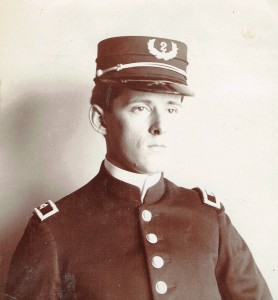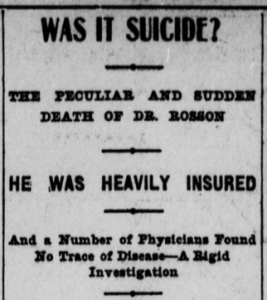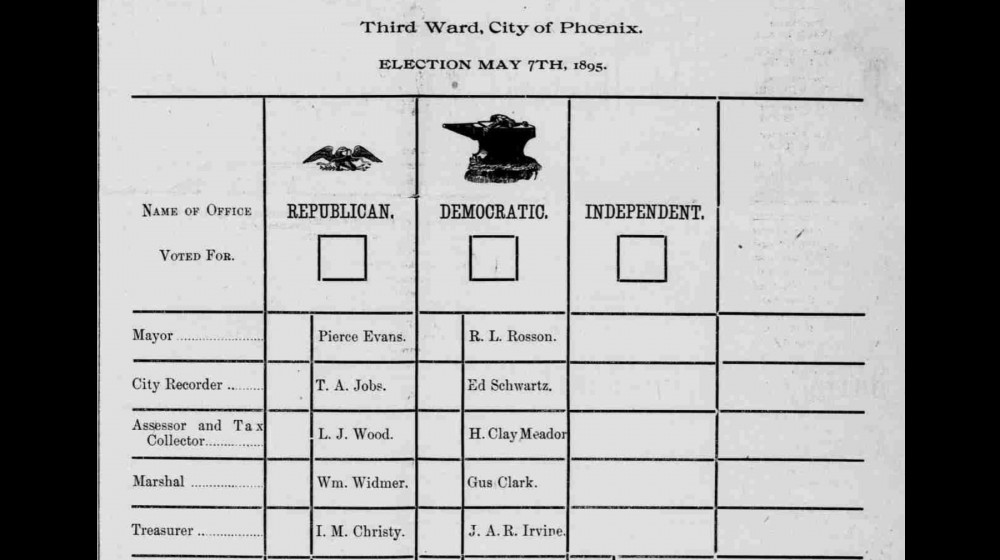We’re No Angels
Did you know…
Even though Rosson House Museum is named after them, there just isn’t a lot we know about the Rosson family. We don’t have stories passed down, or even their letters or journals to let us know firsthand what their lives were like while they lived on Block 14. What we do know has been culled from newspapers and other primary sources, giving us a glimpse at this unique Phoenix landmark’s first family. And that brief look has turned up some controversy in Dr. Rosson’s short life.
Roland Lee Rosson was born to James and Pamelia Rosson in 1851, in Catalpa, Culpepper County, Virginia. James is listed in the 1850 census as a tailor, and in the 1870 census as a farmer (the 1860 census has no occupation listed for him). The Rossons were clearly not a wealthy family, and yet their son was able to attend the University of Virginia, graduating in July 1873 with a degree from the Medical Department.
Rosson next shows up as a First Lieutenant and assistant surgeon at Ft. Monroe in Old Point Comfort, VA, in 1875. In October 1876, the Arizona Citizen (Tucson) mentioned Dr. R. L. Rosson’s arrival in Arizona on the Southern Overland Stage. By 1877, he was posted to Camp Thomas, and over the next couple of years, bounced around between posts in Camp Thomas, Ft. Yuma, Camp Apache, and eventually Camp Grant.
Other than the places where he was stationed, the only information we have about Rosson’s army service is that it ended in court martial and controversy. In March 1879, the Arizona Sentinel (Yuma) published an article about the results of the Overton vs. Rosson court martial. During trial, Lt. G. E. Overton accused Dr. Rosson of visiting a dance house, using “improper language in conversation”, and of prescribing and giving an “indigent civilian” medicine that belonged to the US Army (worth $1.68 then, and about $35 today). Rosson was found guilty and summarily dismissed from service. The article, however, goes on to say that whether or not Rosson was guilty of these “crimes”, he was a gentleman, unlike the man who accused him. They report Overton as a petty and spiteful man who did not, “enjoy the esteem or respect of his fellow officers and soldiers,” and who only reported on Rosson’s activities after the doctor refused to supply Overton with (stolen) US Army medicine to set up a dispensary of his own. It’s interesting that Dr. Rosson’s later political career did not seem to have been affected by his court martial, and this attitude towards his accuser may have actually helped him
After the army, Dr. Rosson spent time in Yuma as a Medical Officer with the territorial prison, and then settled in Phoenix. If you’ve been on a Rosson House tour, you know he married Flora Bell Murray in 1880, acted as a general practitioner here, and served in various elected or appointed posts within Maricopa County. In May 1895, Dr. Rosson was elected as Mayor of the city of Phoenix, but by April 1896 he resigned, saying that he tired of the office. Though he ran for other elected offices in Maricopa County, Rosson was not successful. In addition to his work as a doctor, he invested in mining with his brother-in-law, Neri Osborne (Flora’s sister’s husband).
On June 10, 1897, the Phoenix Weekly Herald reported the sale of the Rosson House to Aaron Goldberg for $10,000. The Rossons moved on to Los Angeles, California, and not much is heard about them until May 11, 1898, with Dr. Rosson’s untimely death at the age of 47.  Before the advent antibiotics and vaccines, it wasn’t unusual for people to die at such a young age. What made Dr. Rosson’s death unusual and ultimately suspect, were his recent purchases of life insurance and the manner of his passing — he suffered from acute gastroenteritis on and off for a very brief period of time, which (among other things) is often a symptom of poisoning. Newspapers had a heyday, suggesting that Dr. Rosson had committed suicide, and the coroner’s office performed an autopsy. A Professor of Chemistry from the University of California tested Rosson’s internal organs for, “vegetable and mineral poisons,” but the results came back negative. Flora was able to collect the $36,000 insurance money (updated – worth a cool $1.3 million in 2023). Roland and Flora’s only surviving son, Clyde, died in 1904 (at 20 years old), and Flora passed away in 1911 at the age of 52.
Before the advent antibiotics and vaccines, it wasn’t unusual for people to die at such a young age. What made Dr. Rosson’s death unusual and ultimately suspect, were his recent purchases of life insurance and the manner of his passing — he suffered from acute gastroenteritis on and off for a very brief period of time, which (among other things) is often a symptom of poisoning. Newspapers had a heyday, suggesting that Dr. Rosson had committed suicide, and the coroner’s office performed an autopsy. A Professor of Chemistry from the University of California tested Rosson’s internal organs for, “vegetable and mineral poisons,” but the results came back negative. Flora was able to collect the $36,000 insurance money (updated – worth a cool $1.3 million in 2023). Roland and Flora’s only surviving son, Clyde, died in 1904 (at 20 years old), and Flora passed away in 1911 at the age of 52.
The decedents of the Rosson’s daughters have visited the Rosson House over the years. By talking with them, and working with a local man who has researched Dr. Rosson’s court martial in hopes of getting his dishonorable discharge overturned, we learn more about the Rossons every day!
Learn more about Flora Rosson from our June 2020 blog article, Rumors and Speculation.
Archive
-
2025
-
January (1)
-
-
2024
-
December (1)
-
November (1)
-
October (1)
-
September (1)
-
August (1)
-
July (1)
-
June (1)
-
May (1)
-
April (1)
-
March (1)
-
February (1)
-
January (1)
-
-
2023
-
December (1)
-
November (1)
-
October (1)
-
September (1)
-
August (1)
-
July (1)
-
June (1)
-
May (1)
-
April (1)
-
March (1)
-
February (1)
-
January (1)
-
-
2022
-
December (1)
-
November (1)
-
October (1)
-
September (1)
-
August (1)
-
July (1)
-
June (1)
-
May (1)
-
April (1)
-
-
2021
-
December (1)
-
November (1)
-
October (1)
-
September (1)
-
August (1)
-
July (1)
-
June (1)
-
May (1)
-
April (1)
-
March (1)
-
February (1)
-
January (1)
-
-
2020
-
December (1)
-
November (1)
-
October (1)
-
September (1)
-
August (1)
-
July (1)
-
June (1)
-
May (1)
-
April (1)
-
March (1)
-
February (1)
-
January (1)
-
-
2019
-
December (1)
-
November (1)
-
October (1)
-
September (1)
-
August (1)
-
July (1)
-
June (1)
-
May (1)
-
April (1)
-
March (1)
-
February (1)
-
January (1)
-
-
2018
-
December (1)
-
November (1)
-
October (1)
-
September (1)
-
August (1)
-
July (1)
-
May (1)
-
April (1)
-
March (1)
-
February (1)
-
January (1)
-
-
2017
-
December (1)
-
November (1)
-
October (1)
-
September (1)
-
August (1)
-
July (1)
-
June (1)
-
May (1)
-
April (1)
-
March (1)
-
February (1)
-
-
2016
-
December (1)
-
-
2015
-
2014
-
July (1)
-
